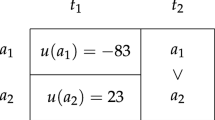Abstract
It is commonly assumed that moral deliberation requires that the alternatives available in a choice situation are evaluatively comparable. This comparability assumption is threatened by claims of incomparability, which is often established by means of the small improvement argument (SIA). In this paper I argue that SIA does not establish incomparability in a stricter sense. The reason is that it fails to distinguish incomparability from a kind of evaluative indeterminacy which may arise due to the vagueness of the evaluative comparatives ‘better than,’ ‘worse than,’ and ‘equally as good as.’
Similar content being viewed by others
References
Broome, J. (1997). Is incommensurability vagueness? In R. Chang (Ed.), Incommensurability, incomparability, and practical reason (pp. 67–89). Harvard University Press.
Broome, J. (2004). Weighing lives. Oxford University Press.
Carlson E. (2004). Broomes argument against value incomparability. Utilitas 16: 220–224
Carlson, E. (2006). Incomparability and measurement of value. In K. McDaniel et al. (Eds.), The good, the right, life, and death. Aldershot: Ashgate.
Chang, R. (1997). Introduction. In R. Chang (Ed.), Incommensurability, incomparability, and practical reason. Harvard University Press.
Chang R. (2002). The possibility of parity. Ethics 112:659–688
Chang R. (2004). All things considered. Philosophical Perspectives 14: 1–22
Fine K. (1975). Vagueness, truth, and logic. Synthese 30:265–300
Griffin, J. (1986). Well-being. Oxford University Press.
Harris G.W. (2001). Value vagueness, zones of incomparability, and tragedy. American Philosophical Quarterly 38: 155–176
Hsieh N. (2005). Equality, clumpiness, and incomparability. Utilitas 17: 180–204
Parfit, D. (1984). Reasons and persons. Oxford University Press.
Qizilbash M. (2000). Comparability of values, rough equality and vagueness: Griffin and Broome on Incommensurability. Utilitas 12: 223–240
Rabinowicz, W. (2005). Vagueness and small improvement. Unpublished draft, Lund University.
Raz, J. (1986). The morality of freedom. Clarendon Press.
Regan D. (1989). Authority and value: Reflections on Raz’ morality and freedom. Southern California Law Review 62: 995–1095
Savage, L. J. (1954). The foundations of statistics (2nd ed. (1972)). Dover.
Williamson, T. (1994). Vagueness. Routledge.
Author information
Authors and Affiliations
Corresponding author
Rights and permissions
About this article
Cite this article
Espinoza, N. The small improvement argument. Synthese 165, 127–139 (2008). https://doi.org/10.1007/s11229-007-9243-0
Received:
Accepted:
Published:
Issue Date:
DOI: https://doi.org/10.1007/s11229-007-9243-0



